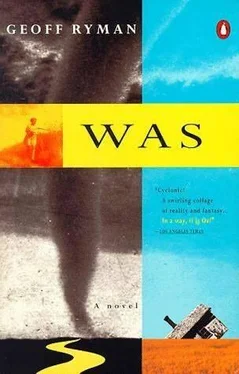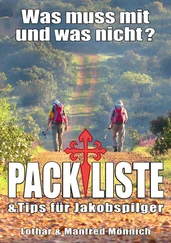"It says Gulch," said Bill. "Is that a name or a geographical feature?"
"I don't know," said the young man. "I also had this."
He tossed down onto the table a Xerox of a photograph.
It showed a white, one-room wooden building with two windows on either side of a narrow roofed porch. The building also had a small bell tower.
Lined up outside it were about ten children in gingham checks or knickerbockers and a woman. She stood very stiffly, hands behind her back, smiling and young in a long, dark skirt and white blouse with mutton sleeves. In crabbed handwriting were the words "Sunflower School."
"That will make it ten seventy for copies," said the young man.
"Oh golly. Oh golly," said Jonathan. "What if it's her? What if it's her in the photograph? Huh? Huh?"
The pale young man looked at him. "Whatever it is you're looking for," he said, "you're not going to find it in an old photograph. It's only history, you know."
They drove. Bill had great difficulty finding Highway 18 out of town-the on-ramp rose out of the old streets that had not been razed for the shopping mall. Then very quickly they were passing over the levee, a great hump of green grass, then trees, and then they were driving over the Kansas River on a narrow bridge with narrow railed walkways. There were sandbanks in the river and the concrete supports of another modern bridge, crossing diagonally under them. It had been washed away.
Then the river was gone in a flurry of leaves. The highway divided. ZEANDALE, said a sign to the left. The road eased itself up a slope and down again. On one side there was flat, open farmland, on the other steep shaded woodland.
"Look at it!" said Jonathan. To the left were wide fields of almost orange sorghum, the heads in thick clumps. There were windmills far away and old farmhouses surrounded by beech and walnut that had been planted a hundred years before. Trees in a long line marked where the river flowed. Running parallel to the road, through hedges and fields and shrubbery, there was a gap where the railroad once had been.
"Clop clop clop," said Jonathan, very faintly, transfixed.
Bill balanced maps and photocopies on his lap, glancing down. "The river curves in again close to the road just before we get to the school."
"Fwoooo whooosh," said Jonathan. "The river moves. It rolls over in its sleep."
The papers fluttered.
The woodland left them, moving south. There were fields on either side now, flat, rich, and the road was straight for miles. Zeandale village was a blur ahead of them, blue with distance, wavering with rising heat. There were lanes to the right. Bill slowed. PLEASANT VALLEY CEMETARY, said a sign pointing right. They passed another lane, with a clump of trees.
"It's supposed to be on the right," said Bill. They both grew more anxious, leaning forward, peering.
"That's it," said Bill suddenly, flicking on the turn signal and pulling over to the right, the sound of dust under tires.
On the wrong side of the road was the schoolhouse. It had been painted gunmetal blue.
"That's not it," said Jonathan, very quickly, very firmly.
"I think it is," said Bill, and got out. Dust from the soft shoulder still drifted across the road. The silence was very sudden, very complete. Their footsteps sounded very clearly as they crossed the road.
As they neared the old building, a droning noise started. It was as if a hollow tube were being whirled over their heads. Locusts.
"It's the same building," said Bill, holding the photograph.
The front porch had been turned into an extension, its door turned into a window. There was the bell tower.
"That's not it," said Jonathan in a wisp of a voice.
Bill chuckled a bit with exasperation. "It is. Look, everything's there."
Suddenly Jonathan was shouting. "It's the wrong goddamned side of the road!" He ran out of breath. He began to make noises as if he were about to sneeze. "Huh ahuh ahuh ahuh."
"Breathe slowly," Bill said. Jonathan knocked away his hand.
"The memoirs say it's on a lane! Ahuh ahuh. The plat book says it's on a lane!"
"Roads move."
"On a lane that leads to the hills. Where are the hills? A big, bald hill where Dorothy made snowmen!"
Bill went still and cold. That's what the old lady had said. Snowmen, with Wilbur, on a hill. Angels in the snow.
"It's on the wrong side of the road, it's pointing the wrong way. It's the wrong goddamned schoolhouse!"
As if clubbed, Jonathan dropped. He sat down in the middle of the road.
"Jonathan, that's kind of a dumb place to sit." Bill tugged at his arm. Jonathan started to cry with frustration.
"That place was built about 1890!"
"Look, it says Sunflower School. Stand up, Jay, out of the road."
"It was rebuilt in a different place!" Jonathan had flowered into full tears.
"How do you know it's 1890?"
"My clock. My clock is never wrong. Look, the teacher's wearing mutton sleeves."
"Jay, get out of the road!"
"It's my last day, and we haven't found it!" He pounded the asphalt with the flat of his hand. "We've fucked it."
On the horizon, a car was coming.
"Jonathan. Please stand up."
"What for?"
"So we can keep looking."
The car was shimmying like a dancer.
"I just want to stay here. I don't want to go on."
Bill leaned over. "Jonathan. You know what we're going to do? There was a sign back there for a cemetery. Remember? We're going to go to the cemetery."
"What good is that going to do?"
"You're asking me? What are cemeteries good for, Jonathan? Names. Names and families."
Jonathan looked up. "Yeah," he said.
"Come on, let's get up."
The other car began to flash its lights.
The road to the cemetery went up the hills to bald grassy slopes and down again through thickly shaded ravines, over shaded rivulets, toward a place called Deep Creek.
Jonathan snored. His whole face was going an unnatural brown, as if he had spent his life under a sunlamp. Beads of sweat were trickling down him, as if he were melting. Bill felt guilty. I should have taken you to the hospital, he thought. I know better. He promised his profession: Jonathan, I get you back into care by four this afternoon.
Under the blue sky, amid the brown grass and the passing shadows, Bill felt alone. He looked back at the mask that was Jonathan's face and spoke to it.
"I don't believe in God anymore, Jonathan," said Bill. "My faith has gone. I think… I think I need some kind of sign. You have visions, Jonathan. Do you have visions of God?"
Jonathan didn't, couldn't, answer.
Pleasant Valley had a chain-link fence around it and a big metal gate with upright bars and letters cut clean through large metal plaques on either side of stone gateposts. PLEASANT, said one side. VALLEY, said the other. A dirt driveway led between two conifers and circled through the tough little oaks of the cemetery.
It was on a hill far from anywhere. Jonathan and Bill left the car parked in the lane near the gates. The sound of crickets was high, strong, sweet. The air was surprisingly cool, and there was a strong wind, as if the Spirit were moving. Jonathan's eyes were yellow and feverish, and he looked distracted. He blinked and stumbled up onto a concrete platform, with a gravestone at its head like a pillow. At its foot, planted in the concrete, was a rusty old hand pump.
Jonathan played with the pump's long wooden handle. "Can you imagine what a water pump must have meant to them? No more buckets hauled up from the well. I bet this was some old guy who finally bought a water pump. And he was so proud of it, they used it for his gravestone."
They wandered between the stones. The names carved into them were already familiar. There were Pillsburys scattered everywhere.
Читать дальше












